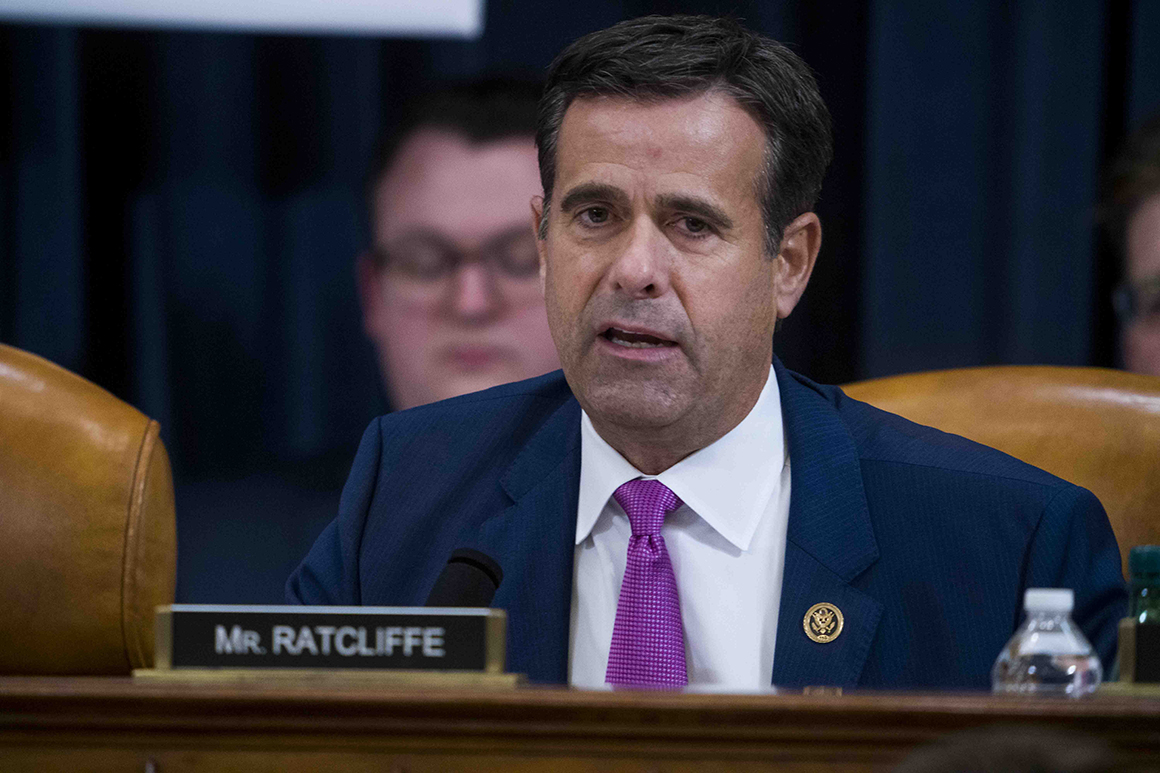
The intelligence agencies are currently run by an acting director, Ric Grenell, who can only serve through March 11 unless the White House nominates a permanent replacement. Grenell can now stay on while Ratcliffe’s nomination is pending.
The intelligence community has only been pulled further into the political miasma since Ratcliffe was last floated for the job. After being acquitted on impeachment charges — which were prompted by a intelligence community whistleblower — Trump has moved to install more loyalists to better control the agencies.
Yet Ratcliffe’s reemergence is still remarkable given the reaction that greeted his potential appointment last time around.
Trump’s first attempt to place Ratcliffe atop the Office of the Director of National Intelligence set off five furious days of coverage about whether the lawmaker had overstated his work as a federal prosecutor on national security cases. Intelligence veterans also argued that Ratcliffe was too partisan and lacked the necessary qualifications for the job, noting that his main intelligence experience was a few months on the House Intelligence Committee. In the Senate, Democrats raised similar concerns, while Republicans mostly just said they didn’t know Ratcliffe well.
Still, Ratcliffe has long been on Trump’s list for a position in the administration. The president enjoyed Ratcliffe’s fiery grilling of Robert Mueller last July when the special counsel testified before Congress about his probe into Russian election meddling.
„You managed to violate every principle and the most sacred of traditions about prosecutors,” Ratcliffe said, admonishing Mueller for discussing in his final report his team’s thinking over why it didn’t bring certain charges against the president.
Ratcliffe has also been one of the loudest congressional voices arguing that the FBI acted inappropriately when it opened an investigation in 2016 into potential links between Trump’s campaign and Russia.
Years before entering Congress in 2015, Ratcliffe briefly served as the acting U.S. attorney for the Eastern District of Texas, experience he has touted in an attempt to burnish his national security credentials. But news reports caused Ratcliffe’s staff to clarify claims it had made about the lawmaker’s work as a federal prosecutor on terrorism cases.
It is unclear if Ratcliffe’s prospects for confirmation have improved since he was last put up for the job.
Initial reactions Friday night seemed to mirror what happened when Trump put forward Ratcliffe in 2019 — Democrats were vociferously opposed, Republicans were mostly mum and former intelligence officials were exasperated but unsurprised.
“Replacing one highly partisan operative with another does nothing to keep our country safe,“ Senate Minority Leader Chuck Schumer said in a statement, referencing the recent Democratic outrage over the temporary appointment of Grenell, the ambassador to Germany and close Trump political ally who has little intelligence background. “With this nomination, President Trump has shown once again his lack of respect for the rule of law and the intelligence community. Republicans must join Democrats in swiftly rejecting the nomination of Mr. Ratcliffe.”
It’s unclear that Schumer will get Republicans to join him in opposition, though.
“There is no substitute for having a permanent, Senate-confirmed director of national intelligence in place,“ said Senate Intelligence Chairman Richard Burr (R-N.C.), whose committee must vote on whether to advance Ratcliffe’s nomination. „I look forward to receiving Congressman Ratcliffe’s official nomination and ushering it through the Senate’s regular order.”
Some former intelligence officials said Ratcliffe’s nomination was merely a ploy to allow Grenell to stay in the job longer.
„Ratcliffe’s nomination is not a serious nod,“ said Ned Price, a former CIA analyst and National Security Council spokesperson under President Barack Obama, in a statement. Now Grenell can „remain in place longer,“ he added, „potentially throughout much of the 2020 campaign.“
When Ratcliffe withdrew his name the first time around, he said he did not want to deal with what was lining up to be a contentious confirmation battle.
„I was humbled and honored that the President put his trust in me to lead our nation’s intelligence operations and remain convinced that when confirmed, I would have done so with the objectivity, fairness and integrity that our intelligence agencies need and deserve,“ Ratcliffe wrote at the time.
„However, I do not wish for a national security and intelligence debate surrounding my confirmation, however untrue, to become a purely political and partisan issue. The country we all love deserves that it be treated as an American issue.“
Source: politico.com
See more here: news365.stream






